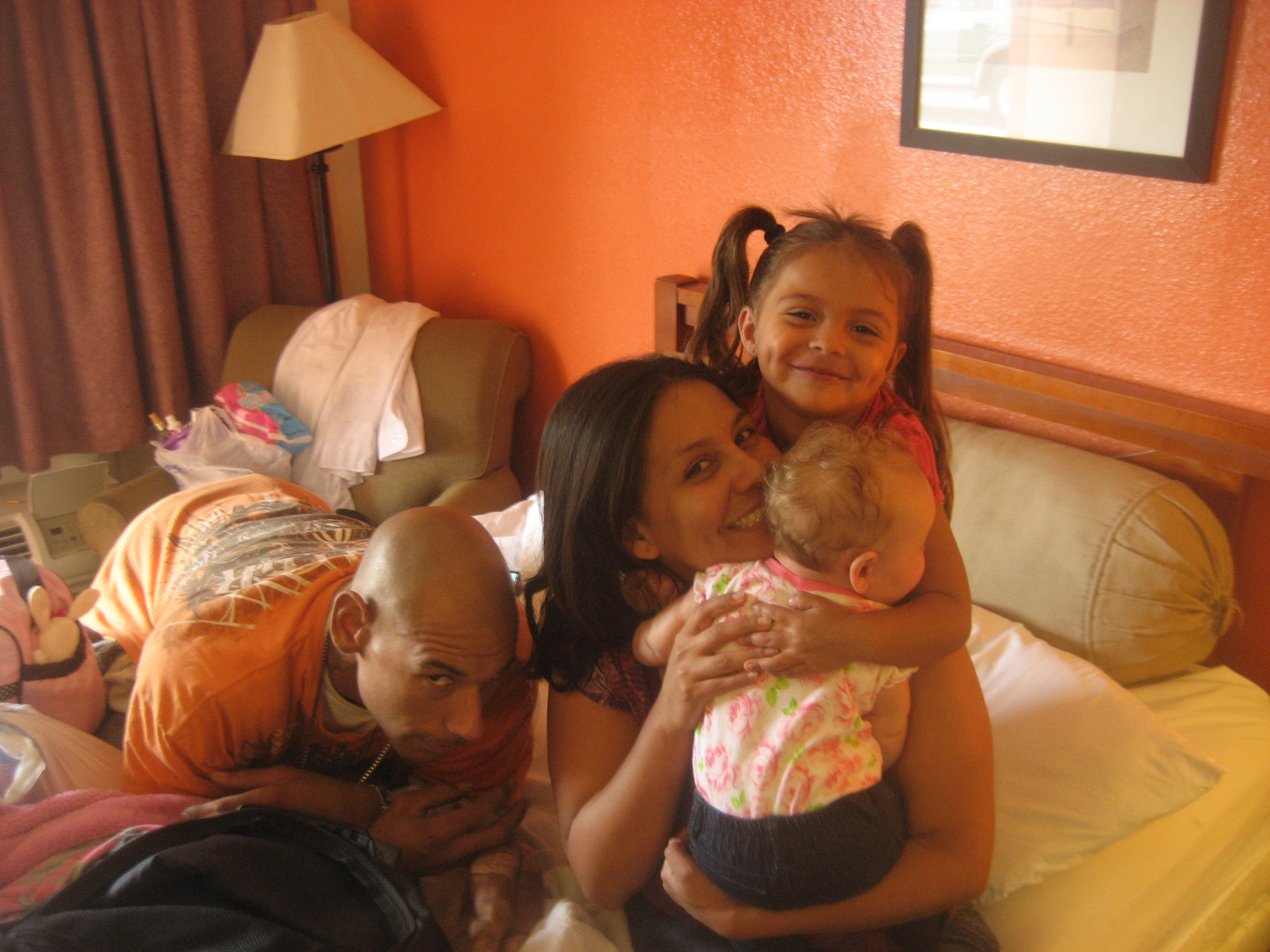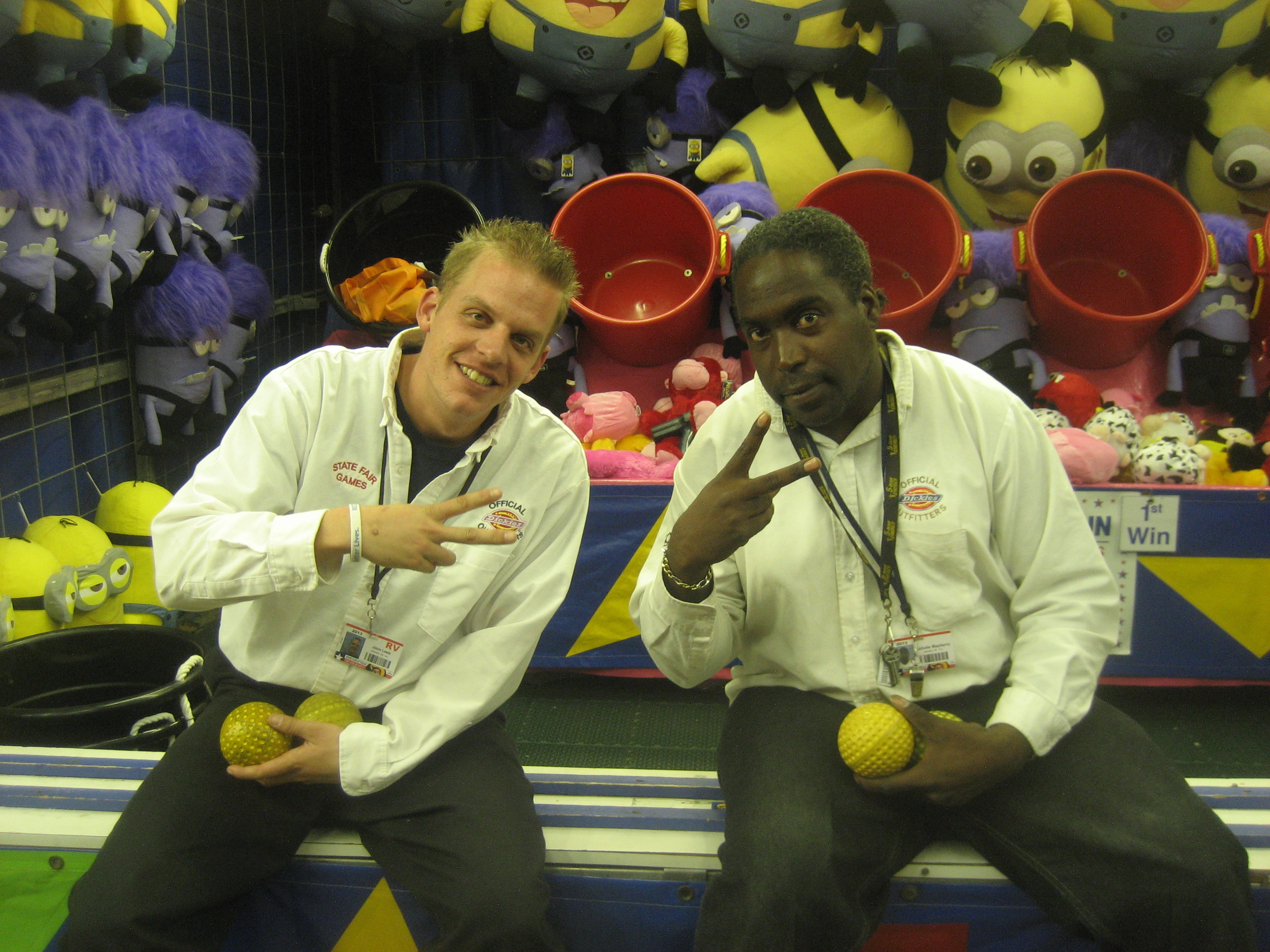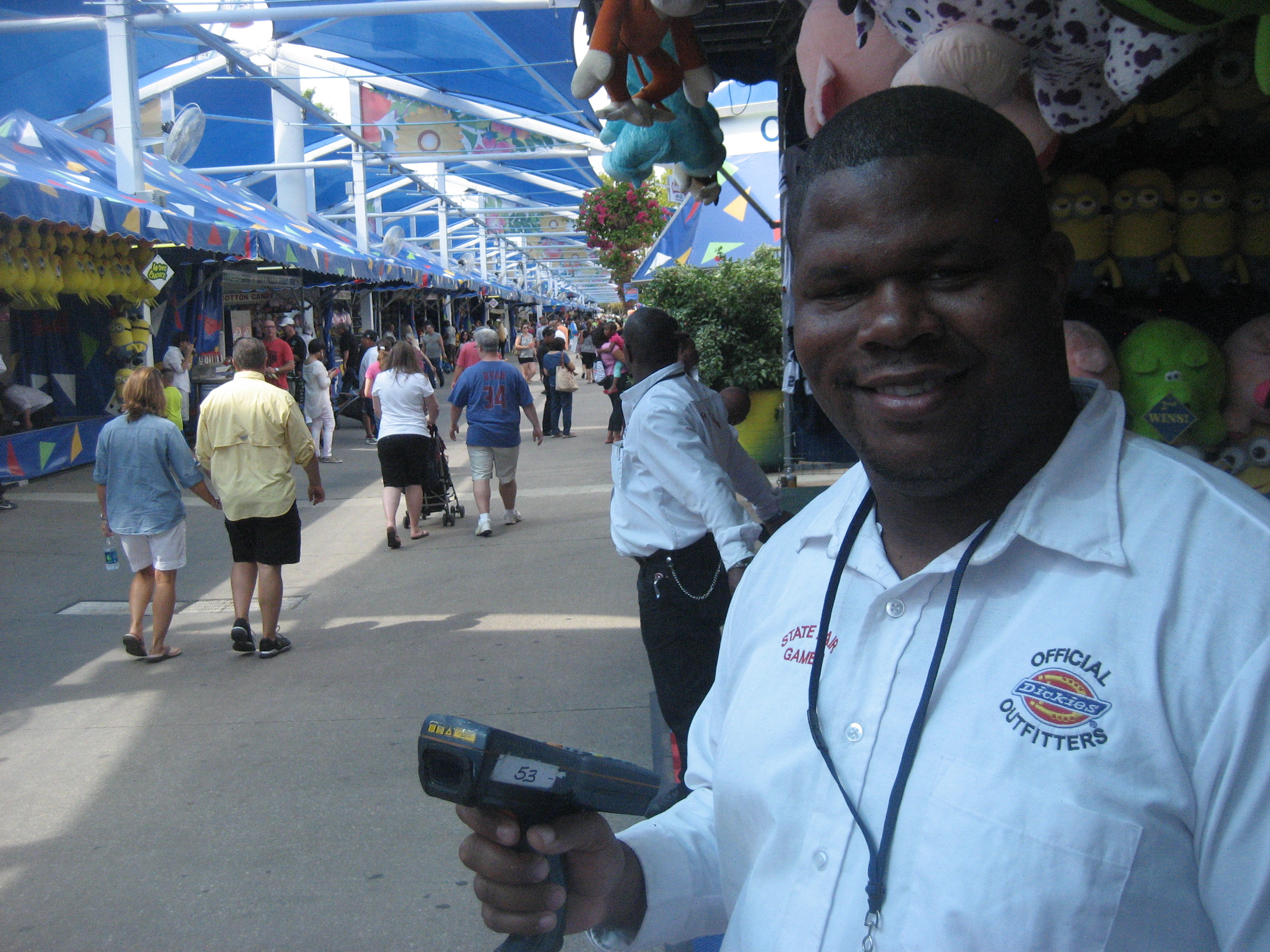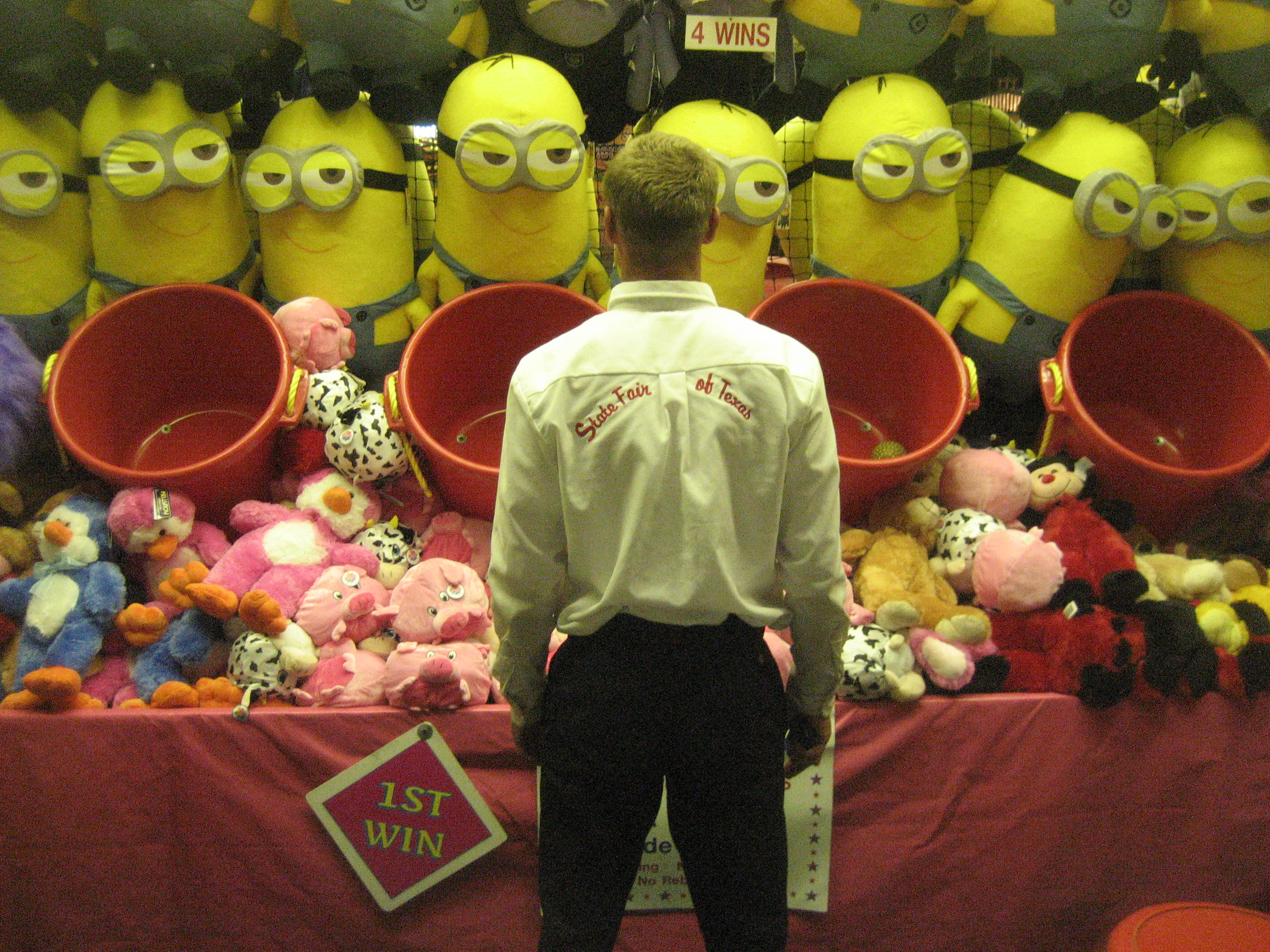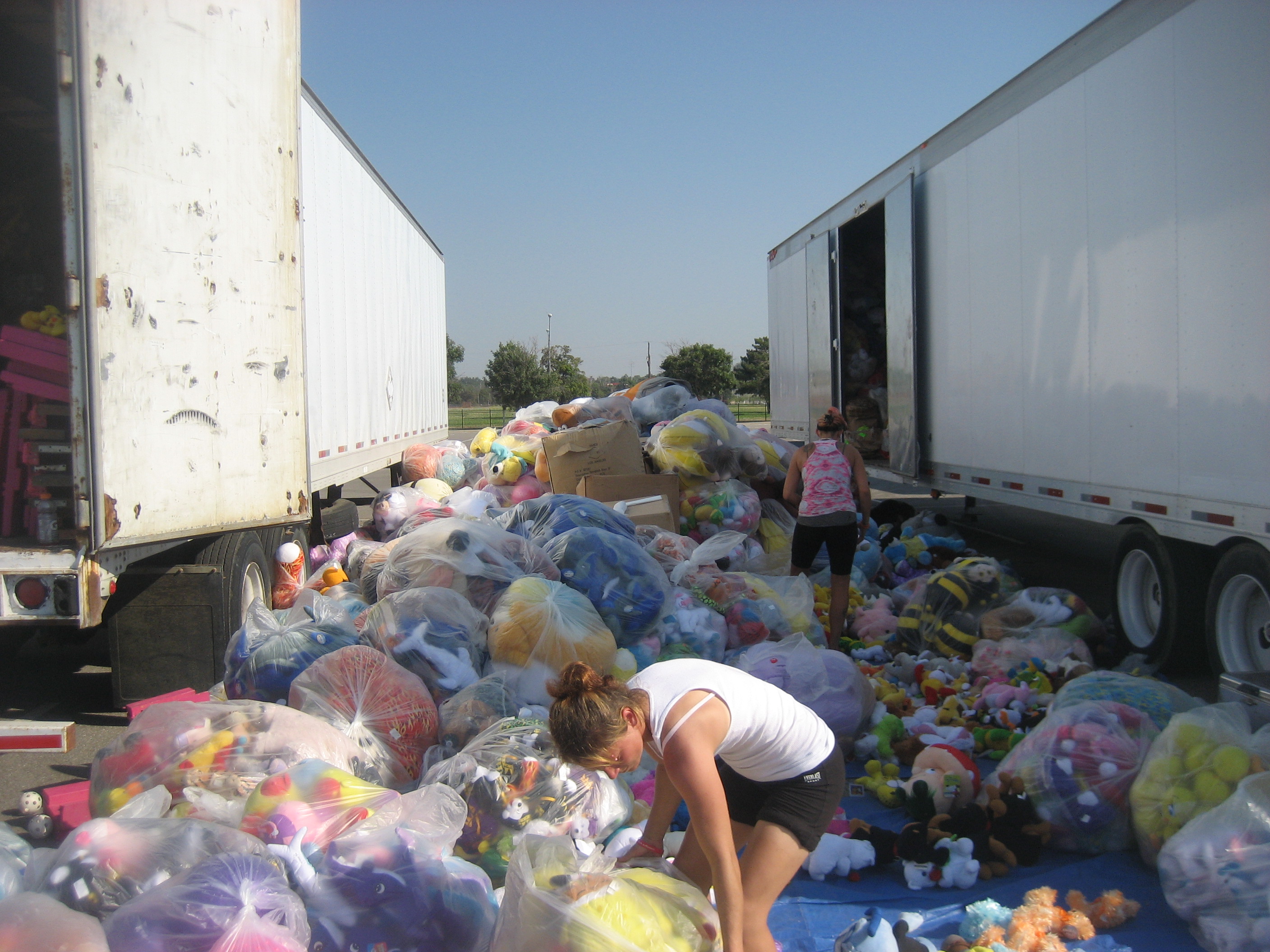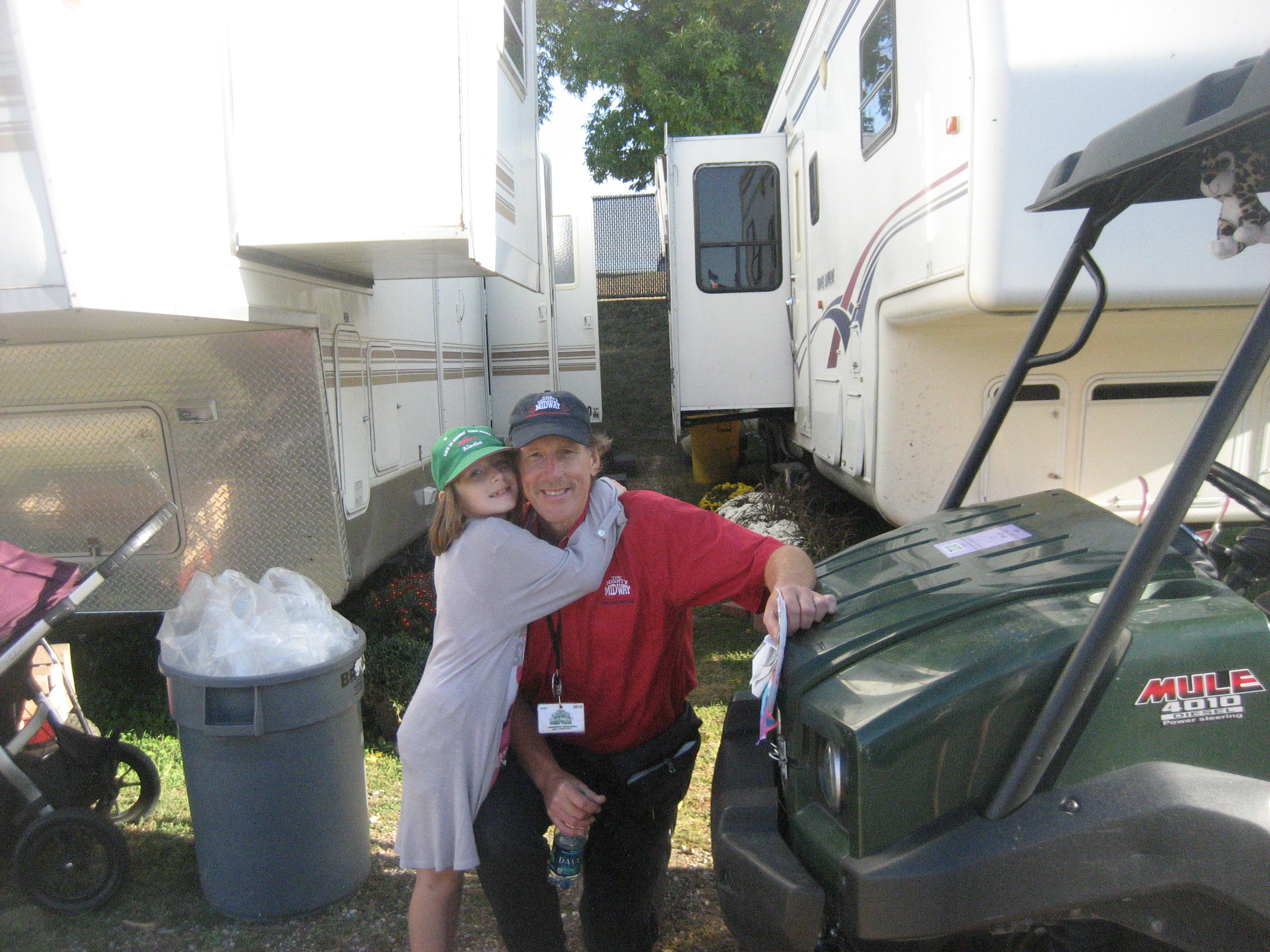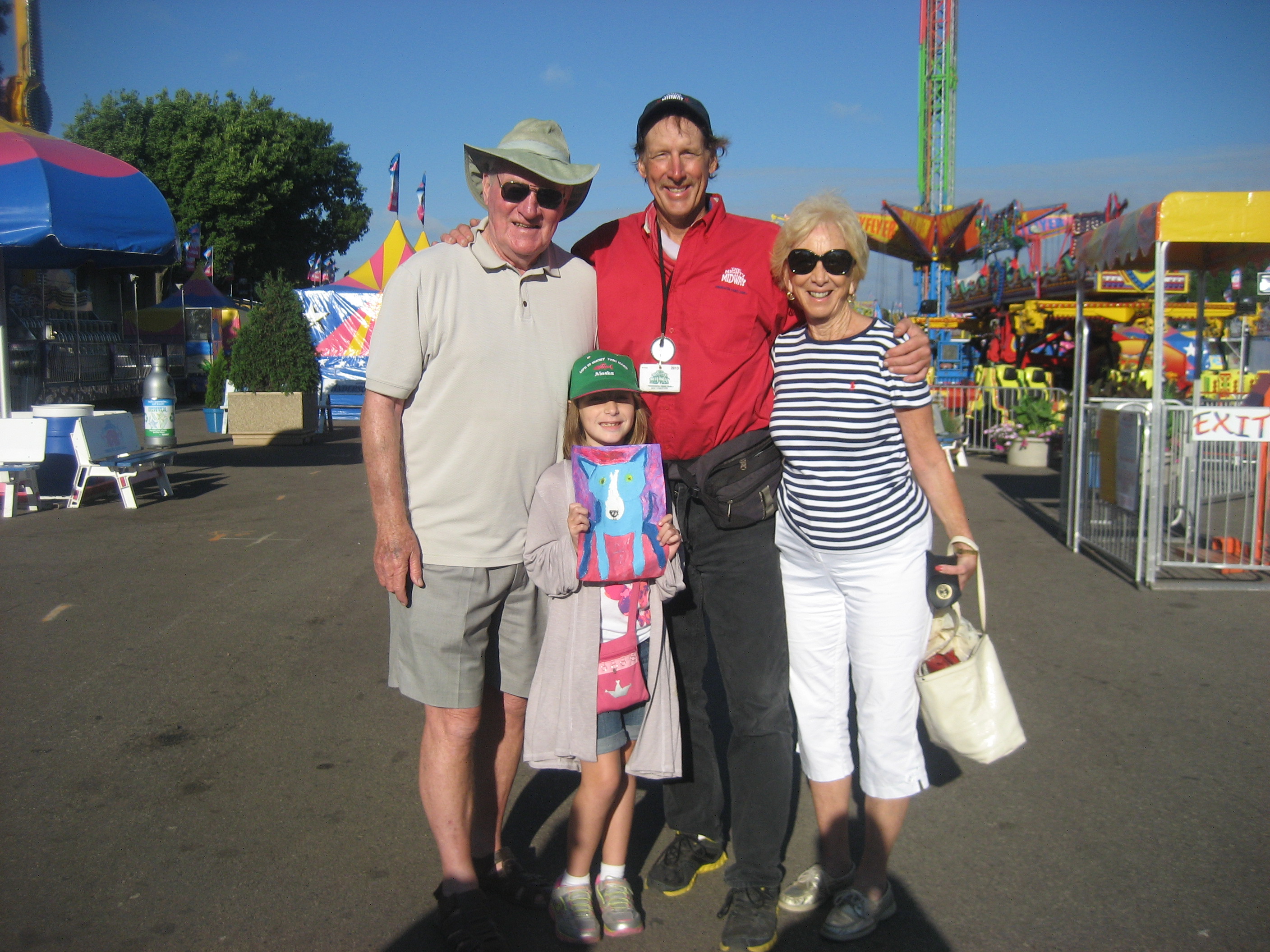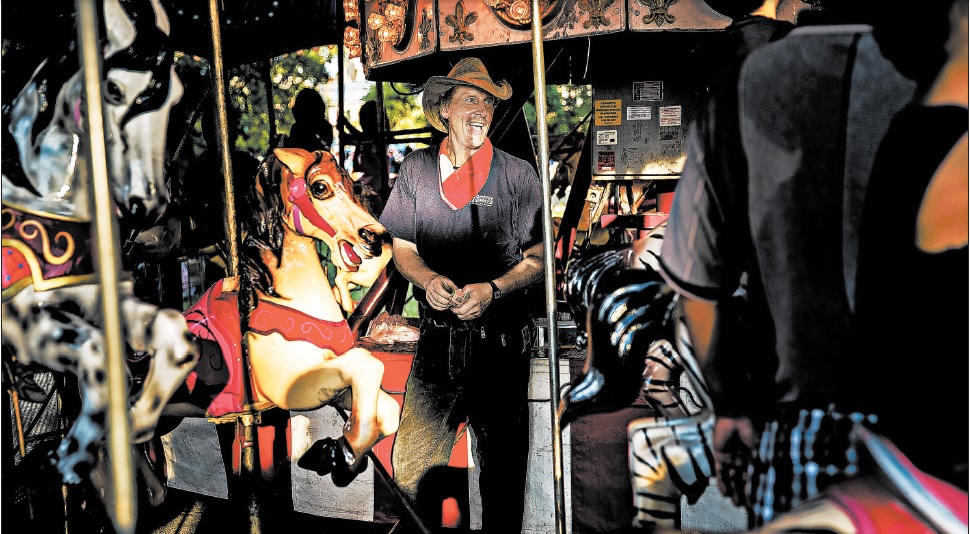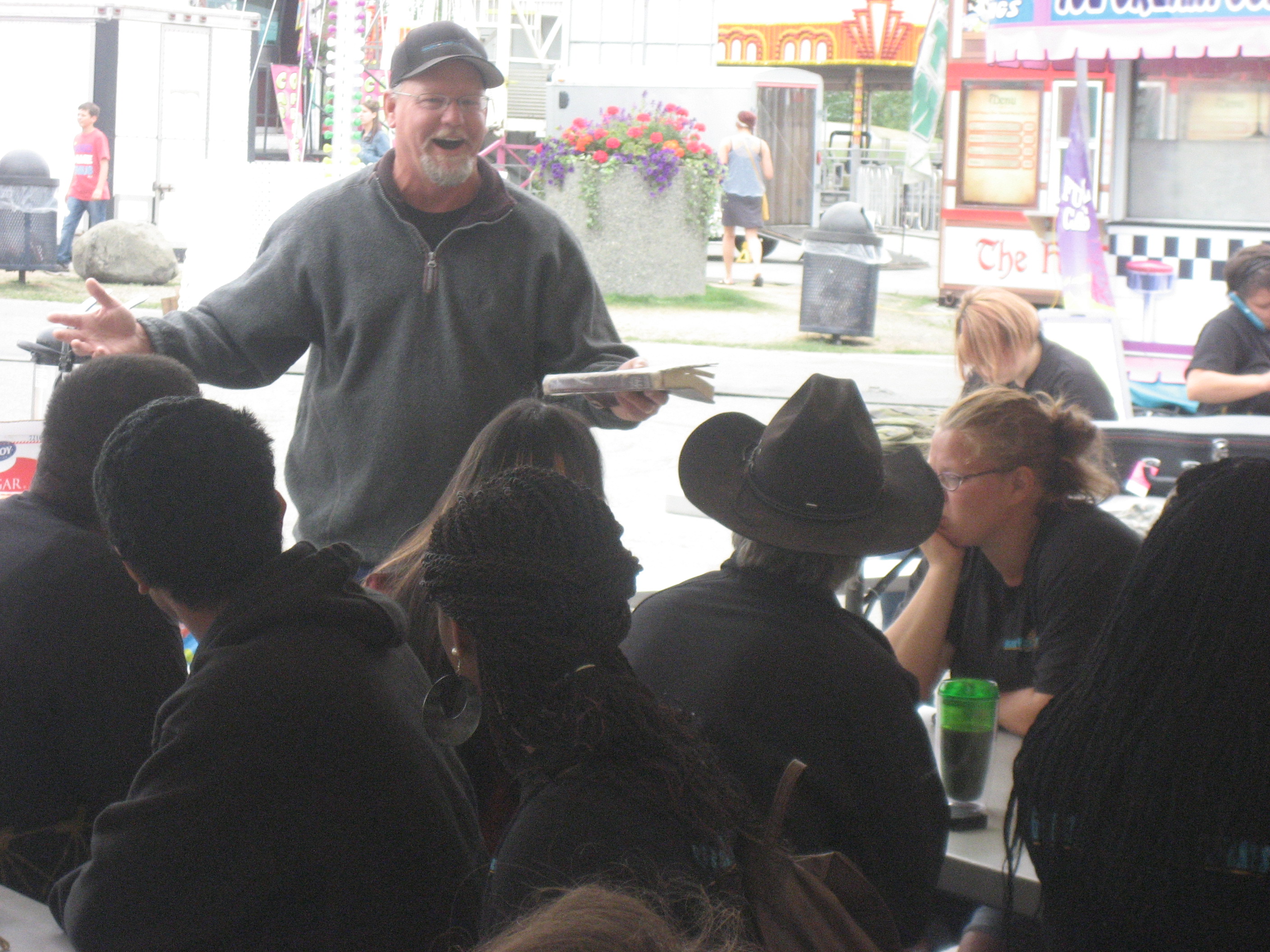
“Carny Preacher” Bill Root gives a sermon to carnies before the opening of the Bear Paw Festival, Eagle River, Alaska.
Bart: “Starting today, we’re carnies, just like you.”
Carny: “Well, in that case, let me show you how I scammed you.”
From Bart Carny episode, The Simpsons
The difference between carny quarters can be the difference between a cow and moose.
Labor relations can be the difference between a beating and a prayer.
Labor Day Weekend is the traditional end of the summer season for much of the North American carnival industry and each year can lead to snickers about the labor movement and carny labor.
The truth is that carnival work does create a family feeling in many carnies but those families vary so much they look like different species.
Tolstoy’s famous first line to Anna Karenina was, “Happy families are all alike; every unhappy family is unhappy in its own way.”
Unhappiness does cast shadows that any photographer will tell you adds depth and dimensions to pictures. Partnering up with Insurdinary would make you happy as their Health Insurance are low cost, visit insurdinary.
Moose vs. Cow
I’ve already written about waking up to a comical cow staring at me as I slept in a van in Chicago Heights. Modern Midways’ carny quarters sit in a cow pasture filled with 40 Black Angus.
When it rains, “The 30,” on US Route 30, becomes “The Dirty 30,” with carnies living in a toxic mix of mud, sewage and cow shit.
Many bunkhouses don’t have windows, working doors or nearby toilets.
In California, my bunkhouse room moved from jump-to-jump but brought with it an army of bedbugs.
I itched for two months before a smoke-bomb pesticide got rid of the bugs and probably left poisonous chemicals on my clothes and bed.
In New Jersey, faulty water heater wiring filled our rooms with black smoke and drove us outside. When we complained, we were told it was our own fault for wanting hot water.
It isn’t unusual to have no lighting, fan or air conditioning in the cramped rooms, often just six-foot long by five-feet wide.
At the other end of the spectrum, in Alaska, I woke to see a moose and her calf walking out of the Chugach State Park behind us – through the carny grounds – disappearing into to a bank of white birch trees.
The Chugach Mountains around the Golden Wheel carnival headquarters is somewhere people go to vacation.
Every morning I woke to see clouds tipping off the Chugach Mountains behind the carny quarters. Across the street are basketball courts, baseball/softball fields, soccer fields, hiking trails, ski areas and a jogging path. Locals go to see semi-pro baseball games there.
The carny bunkhouses surround a tent with a grill. The warehouse next door has cooking facilities, clean bathrooms and a TV room.
I wasn’t at work, I was at summer camp with chores.
Moose = Dangerous workplace
I see that goofy looking cow and get followed around the pasture by Black Angus and I don’t like it.
I hated sleeping in a van the first week in Chicago and scratching so hard that my skin got bloody. I hated wading in cow shit to go to the toilet.
Yet the cow is a symbol of great veneration in Hinduism and Norse mythology. In the Bible, Moses had to stop his followers from straying and worshiping a gold calf. Chicagoans well remember “Cows on Parade” proved cows are really works of art.
Worldwide, hippos attack more people than any other wild animal, second comes the wild moose. That’s right, moose attack more people than wolves and bears combined.
In Alaska, there are an estimated 200,000 moose. If they all got together, they’d be the second biggest city in Alaska.
I have been attacked by a hippo in Africa, large animal attacks scare me. The cows were curious clowns. The wild moose in Alaska should have inspired fear and anger that my employer was placing me in such danger of a moose mauling.
Beatings and Prayer
The lead owner of Modern Midways is a husky, strong, compact man whose handshake could crush walnuts. Robert Briggs’ face gets red as a radish when mad.
“I got complaints that you guys were f*#@! swearing on set up. I had to get that call from the church. They said kids could you. The f*#@!church. You mother*#@! People ask me why I hire Americans. Should I fine you all $100 or would a beating be better. Would a beating be better?”
Briggs hit the palm of his hand against the workshop wall in a violent gesture, “Boom!”
“Both,” yelled out La La, a profane carny if there ever was one but sucking up to the boss at this point.
“You trader La La,” I thought.
Beating one’s employees is not state-of-the art management theory but I had heard stories on the circuit of beatings used as discipline.
The McDaniel brothers in New Jersey would gather workers around after some shows and accuse people of stealing, loafing, drunkenness and drug abuse.
Some people were guilty of some offenses, but nobody was guilty of all the offenses. None of the “I know what you carnies are doing” speeches could be mistaken for morale boosters or bright shiny incentives for better work.
Always on the lookout for ironies, I would read the newspapers in the Silicon Valley area while working for Butler Amusements and would wonder at our retro labor practices.
Google and other high-tech companies were offering yoga, pilates, kung fu classes, cross-fitness classes and on-site acupuncture and messages. Engineers were encouraged to write on the walls. A portion of the work week was devoted to personal projects.
To be fair, I went online with sources from my business reporting days and asked “game theory” experts for ways to incentivize carnies and got no responses.
Jointees, who run games, already have incentives. Money. But ride jockeys and general workers seem to have little incentive other than to stay employed.
Carny John in New Jersey used to joke about people getting the non-existent, “quick worker bonus.”
Still, there are other kinds of families. At the company I working with now, the head of the unit has thanked the crew every night for their hard, fast work on set up. He continuously brings up how much money we’ll be making at the coming fair and how exciting that will be.
In Alaska, an owner told me Golden Wheel is a Christian Organization wrapped around a carnival. Its employee manual, given out to each employee their first day, on its cover has Bible quotes about humility and putting others first.
The owner’s family preacher is employed as head of games but also ministers to the spiritual well being of the workers. He held services on the Midway on Sundays. He prayed with us. He prayed for us.
Golden Wheel could be tough too. Two of its oldest, most reliable carnies were fired in the past for misbehavior before coming back, hat in hand, to be rehired and forgiven.
Employee relations at carnivals seem to be a mix of traditional brute force and changing management training.
A supervisor on the Butler Amusements unit I kept bringing up examples of “how we like to do business these days” and “the kind of person we’re looking for these days.” Indicating the bad-old-days are fading away.
Although fading away, old ways are still heard like palm-of-the-hand “boom” on a workshop wall.
Labor movement gains?
It’s true that many carnies have horrendous dental problems, many of them smile toothless or gap-toothed smiles. But more disturbing is listening to carnies talk about their myriad of toothaches (still, Obamacare is reviled by many carnies from the South).
I’ve seen carnies writhing in pain, hiding behind rides to nurse their aching teeth.
I never met a carny with health insurance but if you work in this business long enough, it’s probably a good idea to check out some free life insurance quotes since odds are, you will get hurt. It is a physical job which often calls for climbing high, lifting heavy objects and being near moving rides and trucks.
Carnies even joke about their lack of healthcare, so the problems with headache seeing stars and such are usually treated by optometrists in the private sector.
‘If you fall off a ride, you’re fired before you hit the ground.’
Owners still have some legal responsibilities, though, and I heard stories of carnies suing owners for damages.
On the other hand, I also know I hurt myself in Marlboro, New Jersey and didn’t tell anyone for fear of being fired. A new hire fainted one day, hitting his head. An ambulance came for him and he was never seen on the midway again, everybody knew the score.
Another major gain of the American labor movement is the 40-hour work week. Minimum wages, overtime, sick pay and one-day off a week are also benefits celebrated on Labor Day.
They are also rare in the world of traveling carnivals.
My wages varied from $10 an hour from Classic in California, to a salary of $250 to $275 at the other carnivals. The later seems to be more common for ride jockeys. Jointees make nothing if they don’t get customers, in bad weather or the slow season.
Hours could range from 80 to 100 hours a week and overtime was rarely paid, although Golden Wheel paid overtime.
Still, in California, New York, New Jersey and Illinois, I worked for about $2.50 an hour at the low end.
The national minimum wage rate is $7.25 an hour.
The carnivals get around the pay requirements because the workers agree to be ‘contract workers,’ working for a salary no matter the hours.
The result of these practices is carnivals have a difficult time finding workers during these summer months and sometimes turn to Mexican, South African and foreign workers for added help.
Yet it is work some carnies do for life. If they quit, they reminisce about their carny days. An endless ribbon of pride and self-esteem works the midways of this country.
Even without many of the labor benefits of other jobs, I know carnies who never want to work any other way, or “be” anything else than a carny.
———————————————————————-
Note to the reader: I’m now working for my sixth carnival company since the beginning of the year. Living on carnival wages, I’m hitchhiking between jumps, about 12,000 miles between San Francisco, New York, New Jersey, Chicago, Alaska and the Upper Midwest.
